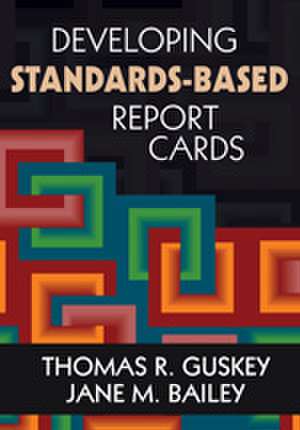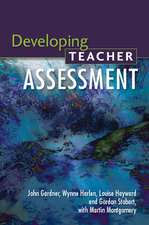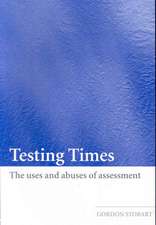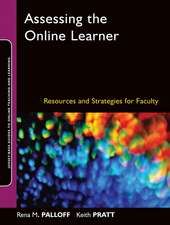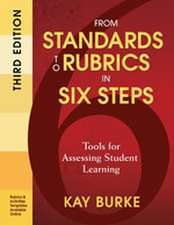Developing Standards-Based Report Cards
Editat de Thomas R. Guskey, Jane M. Baileyen Limba Engleză Paperback – 21 dec 2009
- Provides a clear framework for developing standards-based report cards
- Shows how to communicate with parents, students, and other stakeholders about changes
- Illustrates how to achieve grading consistency without increasing teachers' workloads or violating their professional autonomy
Filled with examples of standards-based report cards that can be adapted to a school's needs, this practical resource shows district and school administrators how to establish reporting practices that facilitate learning.
| Toate formatele și edițiile | Preț | Express |
|---|---|---|
| Paperback (1) | 305.99 lei 6-8 săpt. | |
| SAGE Publications – 21 dec 2009 | 305.99 lei 6-8 săpt. | |
| Hardback (1) | 547.23 lei 6-8 săpt. | |
| SAGE Publications – 18 ian 2010 | 547.23 lei 6-8 săpt. |
Preț: 305.99 lei
Nou
Puncte Express: 459
Preț estimativ în valută:
58.58€ • 61.12$ • 49.10£
58.58€ • 61.12$ • 49.10£
Carte tipărită la comandă
Livrare economică 12-26 martie
Preluare comenzi: 021 569.72.76
Specificații
ISBN-13: 9781412940870
ISBN-10: 1412940877
Pagini: 248
Dimensiuni: 178 x 254 x 15 mm
Greutate: 0.52 kg
Ediția:1
Editura: SAGE Publications
Colecția Corwin
Locul publicării:Thousand Oaks, United States
ISBN-10: 1412940877
Pagini: 248
Dimensiuni: 178 x 254 x 15 mm
Greutate: 0.52 kg
Ediția:1
Editura: SAGE Publications
Colecția Corwin
Locul publicării:Thousand Oaks, United States
Recenzii
"This is a must-read for devoted Guskey-Bailey disciples! This latest addition to their collective wisdom provides clear measures for addressing the unique grading challenges of children with special education needs and children considered gifted or talented in the regular education classroom. Teachers who collaborate on students’ grades will find the recommended practices to be fair, logical, and an excellent way to communicate student learning."
“Guskey and Bailey clearly articulate the need for reform on one of today’s most pressing issues in education: grading and reporting. Throughout the book, they offer realistic solutions to improve how educators communicate a student’s academic progress to all stakeholders. Their work provides the practitioner with the research, step-by-step guidelines, and reporting templates so a faculty is ready to begin the dialogue to develop a standards-based report card. The research has helped us answer the two main questions: 'What goes into a grade?' and 'How do we report it out?' This work, without a doubt, is a model for schools that want to improve their system of grading and reporting. It certainly has transformed ours!”
“Guskey and Bailey clearly articulate the need for reform on one of today’s most pressing issues in education: grading and reporting. Throughout the book, they offer realistic solutions to improve how educators communicate a student’s academic progress to all stakeholders. Their work provides the practitioner with the research, step-by-step guidelines, and reporting templates so a faculty is ready to begin the dialogue to develop a standards-based report card. The research has helped us answer the two main questions: 'What goes into a grade?' and 'How do we report it out?' This work, without a doubt, is a model for schools that want to improve their system of grading and reporting. It certainly has transformed ours!”
Cuprins
About the Authors
1. Getting Started
The Difficulty of Change
The Need for Change
Why Standards Instead of Letter Grades?
Guiding Premises
Our Purpose
Our Organizational Scheme
Our Hope
2. The Importance of Standards
Defining "Standards"
Five Essential Understandings
Standards-Based Report Card Development Levels
Summary
3. Defining the Purpose
Purpose Questions
Leading Discussions About Purpose
Key Questions in Defining the Purpose
Making the Purpose Clear
Method Follows Purpose
Purpose Determines the Development Process
Multiple Purposes Means Multiple Reporting Elements
Focus on a "Reporting System"
Summary
4. Developing Reporting Standards
Reporting Standards
The Development Process
Three Types of Learning Goals
Conflicts in Reporting on Different Learning Goals
Meaning Solutions to the Conflicts
Summary
5. Essential Steps in Development: Part I
Crucial Questions in the Development Process
Summary
6. Essential Steps in Development: Part II
Additional Crucial Questions in the Development Process
Summary
7. Developing Reporting Forms
Defining the Purpose
Selecting the Method Based on the Purpose
Effective Reporting Forms
Combining Methods of Reporting
Format and Graphic Layouts
Design Processes
Additional Sample Reporting Forms
8. Piloting and Revising
Broad-Based Involvement
Focus Groups
Parent, Teacher, and Student Surveys
Test-Driven Reporting
Back to the Drawing Board
Informing the Community
Professional Development
Parent Education Programs
9. Beyond the Report Card: Developing a Reporting System
The Importance of Purpose
The Challenge of Communications
Tools for a Comprehensive Reporting System
Guidelines for Better Practice
Summary
References
Index
1. Getting Started
The Difficulty of Change
The Need for Change
Why Standards Instead of Letter Grades?
Guiding Premises
Our Purpose
Our Organizational Scheme
Our Hope
2. The Importance of Standards
Defining "Standards"
Five Essential Understandings
Standards-Based Report Card Development Levels
Summary
3. Defining the Purpose
Purpose Questions
Leading Discussions About Purpose
Key Questions in Defining the Purpose
Making the Purpose Clear
Method Follows Purpose
Purpose Determines the Development Process
Multiple Purposes Means Multiple Reporting Elements
Focus on a "Reporting System"
Summary
4. Developing Reporting Standards
Reporting Standards
The Development Process
Three Types of Learning Goals
Conflicts in Reporting on Different Learning Goals
Meaning Solutions to the Conflicts
Summary
5. Essential Steps in Development: Part I
Crucial Questions in the Development Process
Summary
6. Essential Steps in Development: Part II
Additional Crucial Questions in the Development Process
Summary
7. Developing Reporting Forms
Defining the Purpose
Selecting the Method Based on the Purpose
Effective Reporting Forms
Combining Methods of Reporting
Format and Graphic Layouts
Design Processes
Additional Sample Reporting Forms
8. Piloting and Revising
Broad-Based Involvement
Focus Groups
Parent, Teacher, and Student Surveys
Test-Driven Reporting
Back to the Drawing Board
Informing the Community
Professional Development
Parent Education Programs
9. Beyond the Report Card: Developing a Reporting System
The Importance of Purpose
The Challenge of Communications
Tools for a Comprehensive Reporting System
Guidelines for Better Practice
Summary
References
Index
Descriere
Providing a clear framework, this volume helps headteachers align assessment and reporting practices with standards-based education and develop more detailed reports of children's learning and progress.
